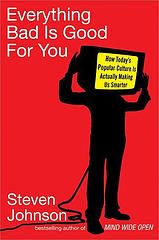just finished the second book discussion at the institute. first was neil postman’s building a bridge to the eighteenth century. second was steve johnson’s everything bad is good for you in which johnson presents a contemporary refutation of postman.
 johnson’s basic premise seems harmless enough. games and tv drama are getting more layered, more complex. the mental exercise is likely making our brains more nimble, might even be improving our problem-solving skills. OK…
johnson’s basic premise seems harmless enough. games and tv drama are getting more layered, more complex. the mental exercise is likely making our brains more nimble, might even be improving our problem-solving skills. OK…
but how can you define good and bad simply in terms of whether one’s brain is better at multi-tasking and problem-solving. i’ll grant that this shift in raw brain power might make us more effective worker bees for our techno-capitalist society, but it doesn’t mean that the substance of our lives or the social fabric is improved.
we don’t need cheerleaders telling us everything is fine — especially when in our gut we’re pretty sure it isn’t. we need to look long and hard at the kind of world we are building with all this technology.
johnson’s book has been widely praised, making it all the more important to hold it up to careful scrutiny. over the next several days we’re going to launch a serious critique of “everything bad is good for you.” please feel encouraged to join in.
if:book
A Project of the Institute for the Future of the Book

For what it’s worth, I did a review of this book last June over at Conversational Reading. I also did a critique of Johnson’s response to his critics here.
I think there are positive and negative aspects to the book. The title is probably the most controversial part of the book — what’s inside, in many ways, doesn’t actually live up to the title. Johnson stops short of arguing that playing video games all day is really the way to self-improvement, but he does point out (accurately, in my view) that popular culture and popular entertainment is becoming more and more complex.
Does this lead to higher IQ? And does all this actually help us perform better in the real world? Not adequately demonstrated, in my view.
Statement I have heard relates to the most advanced society in the history of the world…Germany in the early 20th century. What did they ultimately accomplish? All brain-no heart.
While other researchers and authors are writing about the negative effects of video games, television and the Internet, Johnson is attempting to see the more optimistic side of media today in Everything Bad is Good For You. He focuses on how the complexity of technology is actually giving society a “cognitive workout” and they do not even realize it.
He claims that complexity of television dramas and video games helps to improve a viewer or player’s problem-solving abilities. Problem solving is key to the success of an individual in our fast-paced society today. Can you name a job where an employee is not forced to use problem solving to some extent? The school system knows that this is a major concept an individual must learn and has always taught pupils how to think. Only Mathematicians would find real world value in calculus, but the rest of the students that take higher-level math classes are being trained to use their minds to think hard in order to comprehend difficult concepts.
Why is it such a crime for people to actually enjoy a “cognitive workout?” Most people respond better and learn more in a situation where they can actively participate. Video games engage a child and force them to enhance their “probing” and “telescoping” skills. They learn by doing and focus on immediate tasks that ultimately lead to achieving a larger goal. When a viewer watches a multi-threaded drama such as 24, they are forced to pay close attention and keep track of a complex character web.
New technology is being created constantly due to the concept of electric speed, so there is no use being vehemently opposed to its effects on society. Johnson makes a good effort in this book to justify society’s obsessive use of the Internet and explain why we are so attracted to television and video games. Overall, he gives his readers some information that can help to rationalize our infatuation with popular culture.
Katie’s final observation about Johnson’s book, sums up how I feel about it:
Overall, he gives his readers some information that can help to rationalize our infatuation with popular culture.
If rationalizing an infatuation is what you’re up for, this book is for you.